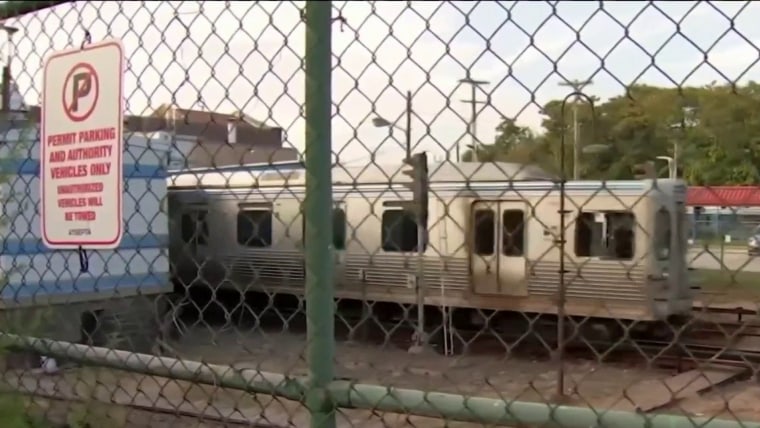For more than 40 minutes a Philadelphia woman was harassed by a stranger on a public transit train and then raped while bystanders held up their cellphones to seemingly record the assault, police said.
The attack happened last Wednesday night on the city's transit system, Southeastern Pennsylvania Transportation Authority, or SEPTA. The incident led to calls from police urging the public "to be our partners and to watch out for other riders" after officials said passengers did not physically intervene or call 911.
Experts have long studied how people react in dangerous or distressing public situations and have often turned to a psychological theory known as the bystander effect to describe individuals who are less likely to help a victim when in a group setting.
“When people are in public, they are less likely to show their concern about something than if they are alone,” said psychologist Bibb Latané. "And what that means is that ... when they see other people aren’t yet doing anything, they may be led to think that, ‘Well, maybe there’s no reason to do anything.'"
Latané and his colleagues helped popularize the bystander effect — or bystander inhibition as he now refers to it — after the 1964 murder of Kitty Genovese in Queens, New York.
Early reports on the killing said that dozens of people witnessed the murder and did not intervene or call the police. Those reports were later proven wrong after it was determined that some people either did call the police or tried to help Genovese.
While the bystander effect may explain how some people respond to victims in public situations, psychiatrist Saumya Davé noted that other factors have to be considered, such as the fear of intervening.
"People might freeze when they see something really scary, especially if the person who is committing the crime or doing the attack has a weapon or seems like they could be overpowering," Davé said.
She also said some people may not know the proper way to help the victim so they choose not to react.
"They may not know how to intervene. When nobody is doing anything, it just perpetuates no one else doing anything. There is a lack of awareness in general about how to best intervene in different situations," she explained.
Latané said it's hard to know exactly what stopped the riders from intervening or calling the police, but said for some, capturing the incident on camera could have been their way of helping the victim.
“A lot of people have credited recording police and incidents as being a very positive thing to do," he said. “If I was doing something wrong and people started pointing a cellphone at me and recording it, that’s going to make me think twice about doing it.”
Davé agreed.
"A lot of people feel that taking a video of the incident is helpful to the victim so they can go back to police and share that evidence," she said.
Over the past few years, bystanders have recorded numerous incidents of police brutality, such as the arrest of George Floyd in Minneapolis or the shooting of Jacob Blake in Kenosha, Wisconsin. The footage has often played a crucial role in the officers being disciplined or charged.
In last week's alleged assault, police said the victim and the suspect, Fiston Ngoy, 35, got on at the same stop in North Philadelphia. Surveillance video showed the woman pushing Ngoy away repeatedly as he harassed her, according to an arrest affidavit.
The video then showed Ngoy rip the woman's pants down and assault her, the affidavit states. Ngoy was arrested on rape and assault charges and is being held on $180,000 bail. His public defender did not immediately return a request for comment on Wednesday.
SEPTA Police Chief Thomas J. Nestel III did not say how many passengers were on the train during the assault but noted that "there were very few notifications to the police."
No calls were made from riders to 911 in Philadelphia, according to Nestel. Police are still waiting to see whether 911 calls were made to Delaware County, which covers the train's last two stops. The attack was eventually reported after a SEPTA employee saw what was happening.
"help" - Google News
October 21, 2021 at 05:28AM
https://ift.tt/3AYi1Ef
Police say riders didn't help woman raped on train. Does 'bystander effect' explain why? - NBC News
"help" - Google News
https://ift.tt/2SmRddm
Bagikan Berita Ini















0 Response to "Police say riders didn't help woman raped on train. Does 'bystander effect' explain why? - NBC News"
Post a Comment